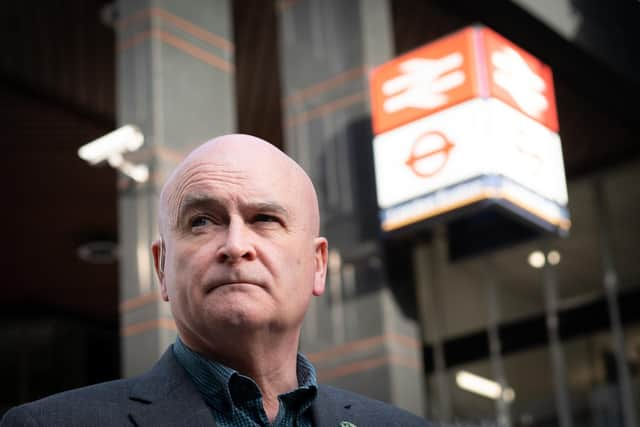Mick Lynch: Unions need the Labour Party but we won't be their lapdogs
In the “dungeon” of the RMT headquarters in Euston a number of years ago, Mick Lynch negotiated with Southern Rail’s about plans to run driver-only trains.
It was Britain’s longest running industrial dispute at the time.
Advertisement
Hide AdAdvertisement
Hide AdThe plans would have seen other staff on board would have seen their jobs lost or diminished as a result, and discussions in the room turned to how those vulnerable staff might be referred to.


“I don’t give a f*** what they’re called. Guards, on-board supervisors, conductors. I don’t give a f*** what they’re called. I just want to save their jobs,” said Mick Lynch according to one source.
That tells you pretty much everything you need to know about the RMT’s current general secretary: no nonsense, intensely loyal to his members, and dismissive about the things that don’t help the people who pay his wages.
“The Labour Party needs to get its act together,” he told The Yorkshire Post earlier this week as his union’s members prepared to go on national strike yet again this summer.
Advertisement
Hide AdAdvertisement
Hide Ad“I don't get a say in who's the leader of the Labour Party or who's in a particular role on the front bench or if they form a government.
“I just want them to be effective and reflect what working class people need, and if they don't do that, they won't get the chance because they won't get voted for.”
Mick’s ideas speak to a wider change in the union movement recently, where unions are less vocal on internal Labour Party politics, and willing to go it alone in disputes, without MPs expected on the picket line.
One source involved in a separate dispute told The Yorkshire Post that their work was “nothing to do with storming the Winter Palace or bringing down the Government, and it’s got very little to do with the Labour Party”,
Advertisement
Hide AdAdvertisement
Hide Ad“We would prefer if the Labour Party supported us, but frankly I don’t care one way or the other because they’re in opposition, and when you’re in opposition you have no power,” they said bluntly.
Despite the fact that Labour’s support is welcome, Mr Lynch dismissed the idea that the trade union movement doesn’t need a Labour Party, but is firm that it’s not a one-way relationship.
“We need a Labour Party, and we need a Labour Party to win but that doesn't mean we should be shackled to it and just a bit like some kind of lapdog while they set the policies, and we just immediately give them money,” he says.
“And my union is not affiliated to them anymore, and won't be getting affiliated,” he adds.
Advertisement
Hide AdAdvertisement
Hide AdWith this uneasy peace between the party and the movement it was born from, and the somewhat disdain that union leaders such as Lynch has towards Starmer and his top team, where do unions go next?
Jeremy Corbyn is gone, as is Len McCluskey, the General Secretary of Unite, and so to, at least to some extent, is the tendency for unions to become embroiled in internal Labour Party politics.
There are relatively new heads of the three of the biggest trade unions: GMB, Unite and UNISON, all of which are affiliated to Labour.
“Their views are slightly more modern and slightly different from their predecessors, and they aren’t wedded to the internal politics of the Labour Party,” one senior union source said.
Advertisement
Hide AdAdvertisement
Hide AdIn 2022, trade unions face the challenge of how to deal with a party that was born out of the industrial revolution, but in a country that relies less and less on traditional industry.
General secretaries are now less focused on the internal rows in a party that many of their members don’t even support.
For a non-affiliated union that doesn’t pay Labour any money, this is somewhat an easier task for Mick Lynch, who has now become, along with his deputy Eddie Dempsey and Dave Ward, the head of the Communication Workers Union, the figureheads for this summer’s strike action.
Part of this is through fronting the Enough Is Enough campaign, which calls for a real pay rise for British workers, along with more Corbyn-era simplicities such as “tax the rich”.
Advertisement
Hide AdAdvertisement
Hide Ad“The unions need to make a distinctive case for trade union values, and they're based around what the Labour Party ought to believe in,” says Mr Lynch, adding that “there's no harm in the unions asserting an independent identity”.
And it’s working, even with Labour’s ban on attending picket lines as it has done in the past.
Arriva bus workers secured a historic 11.1 per cent pay increase this week, which is for now above inflation.
Lawyers, doctors and other professions that are rarely seen on the picket line are now striking over pay and working conditions.
Advertisement
Hide AdAdvertisement
Hide AdThe Enough is Enough campaign has garnered around 400,000 supporters, while news this week showed that the Labour Party has around the same number of members, having lost nearly 100,000 in a single year.
The idea of union and Labour separation, to an extent, seems to suit Keir Starmer just fine with the Labour leader, David Lammy and Rachel Reeves all being very clear this year that if Labour wants to be in government then it won’t be seen dead on a picket line in 2022.
After attempts to “detoxify” Labour’s far-left image under Jeremy Corbyn, Starmer’s job has been to set the Labour party up as a government in waiting, as bar forcing a u-turn on the Windfall Tax, not much can be achieved outside Number 10.
“I would prefer it if the Labour Party fully reflected what the unions want to do and win elections on that basis, but we can't wait for that to happen,” says Mr Lynch.